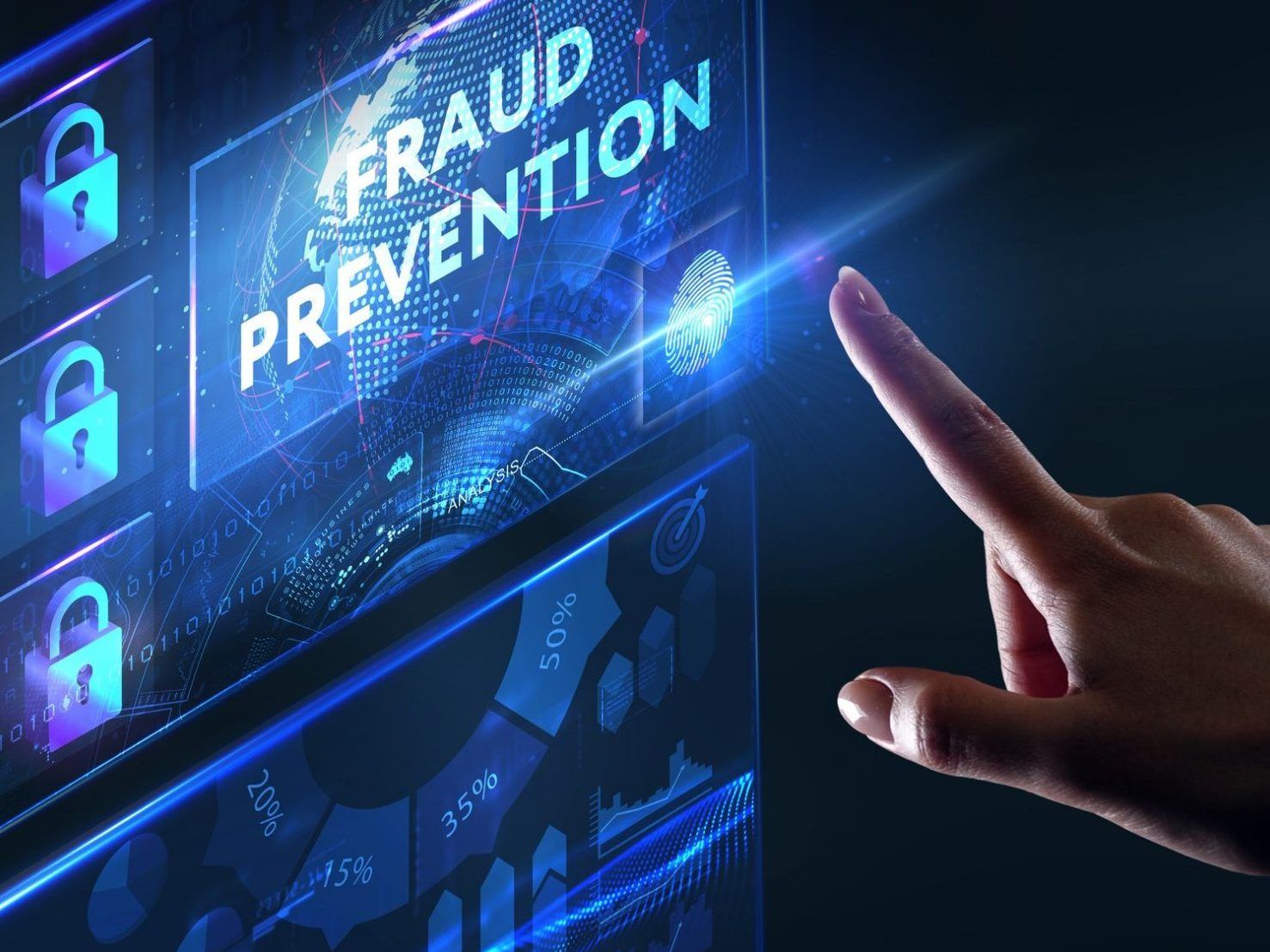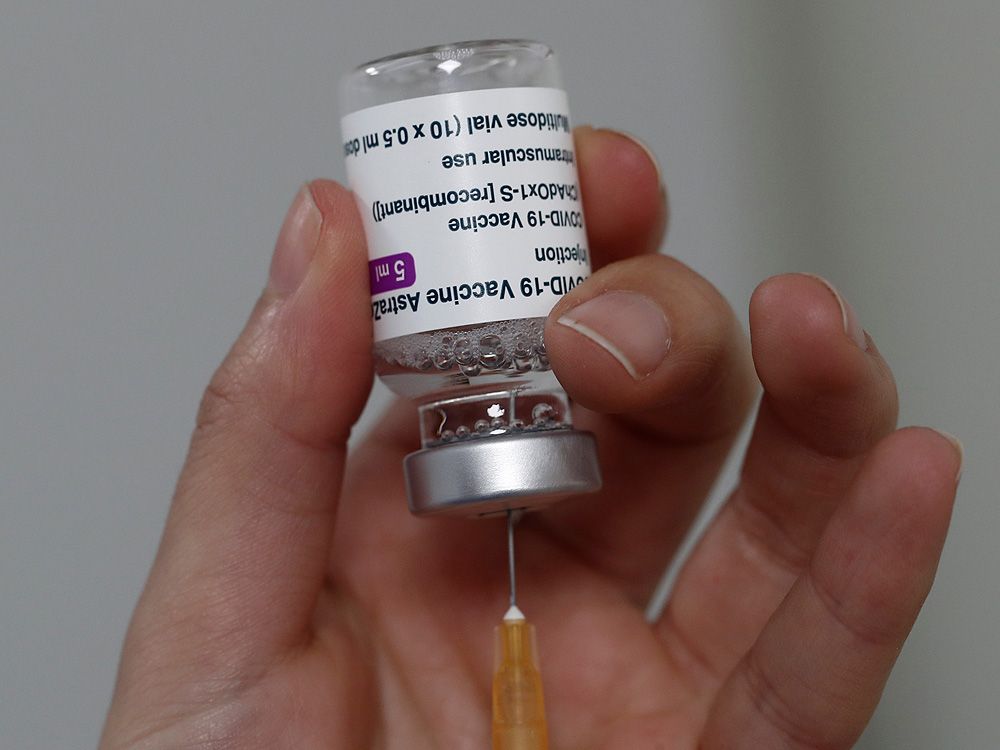COVID-19 'Pandemic'
- Thread starter Ocean Breeze
- Start date
You are using an out of date browser. It may not display this or other websites correctly.
You should upgrade or use an alternative browser.
You should upgrade or use an alternative browser.
Don’t fall for the fraud
Author of the article:Rita DeMontis
Publishing date:Mar 02, 2021 • 3 days ago • 4 minute read • comment bubbleJoin the conversation
Business, technology, internet and networking concept. Young businessman working in the office, select the icon Fraud prevention on the virtual display.
PHOTO BY PUTILICH /Getty Imaages
Article content
Health, money, happiness are subjects that have all been impacted during this extraordinary COVID-19 period. But the world hasn’t stopped turning, and neither has everyday life issues.
Take the subject of fraud. Thanks to the pandemic, with more Canadians living their lives online, fraud continues to dominate the economic scene. March is Fraud Prevention Month, and, according to the Competition Bureau of Canada, Canadians lost nearly $100 million to reported scams in 2019 alone, with numbers even higher in 2020.
The Chartered Professional Accountants of Canada (CPA Canada) recently reported that an alarming 73% of Canadians have received fraudulent requests, with 33% having personally fallen victim to fraud.
Meanwhile, a recent release from The Canadian Anti-Fraud Centre (CAFC), the central agency tracking fraud and identity theft, revealed a staggering nearly $160 million in reported losses in 2020.
Advertisement
STORY CONTINUES BELOW
This advertisement has not loaded yet, but your article continues below.
Article content
Experts can’t stress enough the importance of being vigilant about keeping financial and personal data safe, especially during these complex times.
“We are living in a time when Canadians are particularly susceptible to fraud as a result of the isolation, financial hardships, and stress many have experienced during the COVID-19 pandemic,” said Rachel Jolicoeur, director of fraud prevention and partnerships at Interac Corp., in a recent email. “These vulnerabilities are unfortunately creating new entry points for fraudsters.”
Interac Corp. recently released the findings of a new survey showing that over half (55%) of Canadians worry increased isolation is making people more susceptible to fraud and, in a domino effect, bringing on new levels of stress and vulnerability.
“Fraudsters and identity thieves are always looking to take advantage of a crisis,” said Julie Kuzmic, director of consumer advocacy for Equifax Canada, in a recent release. “It’s understandable to feel vulnerable given these difficult times, but we must remain vigilant.”
“COVID-19 has created the perfect environment for fraudsters to try to gain access to Canadians’ personal and financial information,” said Jason Storsley, VP of fraud management for RBC. “This includes an increase in phishing scams as people continue to spend more time online, whether shopping, using social media or searching for information about the pandemic,” Storsley added in a recent release.
Advertisement
STORY CONTINUES BELOW
This advertisement has not loaded yet, but your article continues below.
Article content
According to Equifax Canada research, since the beginning of the COVID-19 pandemic, 80% of Canadians say they have embraced at least one of the following practices, such as ordering online, curbside pickup, in-store self check-out, in-store pickup of online orders, and restaurant delivery.
The good news is we’re getting more adept at spotting scammers, adds Jolicoeur, with people taking a common-sense approach to not only protecting their identity, but spotting scammers head on.
“We were surprised to see many groups feeling confident in how they spot scams, despite the rise in fraud during these tough times,” added Jolicoeur.
The not-so-good news is how fraud impacts on a person’s mental health state – already challenged by the pandemic.
“The Interac research reveals some interesting findings on the impact of fraud on emotional wellbeing,” said psychologist Dr. Christine Purdon of the University of Waterloo, in an interview.
“We often think of the financial losses resulting from fraud, but there are also important emotional and psychological considerations… Canadians who are already feeling stressed and anxious as a result of COVID-19 may be more vulnerable to fraud.”
There is a silver lining, adds Purdon. “Having experienced fraud and its emotional impacts, Canadians feel motivated to prevent it from happening again. Whether reporting it to authorities, warning friends and family, or researching ways to keep themselves safe, mobilizing to prevent further occurrences of fraud is an important way of taking back control,” said Purdon.
Advertisement
STORY CONTINUES BELOW
This advertisement has not loaded yet, but your article continues below.
Article content
IS THIS LOVE LEGIT?
Looking for love? Make sure it’s in all the right places. The pandemic has brought out all the scammers looking for your hard-earned cash in exchange for false romance.
According to the Canadian Anti-Fraud Centre, in 2020, romance scams became the “Number One fraud affecting Canadians based on dollar loss, at $18.5 million.”
In fact, a recent RBC poll showed 13% of respondents said they have been contacted online by someone they now know was a scammer trying to develop a relationship with them since the start of the pandemic.
RBC reports a romance scam is “where a cyber-criminal pretends to be romantically interested in someone, often through dating or social networking sites. The criminal’s goal is to establish a relationship as quickly as possible, endear themselves to the victim to gain trust and eventually to convince the victim they have fallen in love,” notes a recent media release.
The scammer then asks for money, often claiming it is needed for an emergency or for airfare to visit the victim or asks for photos or personal information that can then be used to blackmail the victim.
“Social distancing measures have caused many Canadians to feel isolated, and as a result, they may be more trusting and vulnerable. Fraudsters are taking advantage of this with romance scams,” said RBC’s Jason Storsley in a recent release.
If you suspect an online relationship is a scam, stop all contact immediately and call the police and your bank right away if you have sent money or shared your financial information, added Storsley.

 torontosun.com
torontosun.com
Author of the article:Rita DeMontis
Publishing date:Mar 02, 2021 • 3 days ago • 4 minute read • comment bubbleJoin the conversation
Business, technology, internet and networking concept. Young businessman working in the office, select the icon Fraud prevention on the virtual display.
PHOTO BY PUTILICH /Getty Imaages
Article content
Health, money, happiness are subjects that have all been impacted during this extraordinary COVID-19 period. But the world hasn’t stopped turning, and neither has everyday life issues.
Take the subject of fraud. Thanks to the pandemic, with more Canadians living their lives online, fraud continues to dominate the economic scene. March is Fraud Prevention Month, and, according to the Competition Bureau of Canada, Canadians lost nearly $100 million to reported scams in 2019 alone, with numbers even higher in 2020.
The Chartered Professional Accountants of Canada (CPA Canada) recently reported that an alarming 73% of Canadians have received fraudulent requests, with 33% having personally fallen victim to fraud.
Meanwhile, a recent release from The Canadian Anti-Fraud Centre (CAFC), the central agency tracking fraud and identity theft, revealed a staggering nearly $160 million in reported losses in 2020.
Advertisement
STORY CONTINUES BELOW
This advertisement has not loaded yet, but your article continues below.
Article content
Experts can’t stress enough the importance of being vigilant about keeping financial and personal data safe, especially during these complex times.
“We are living in a time when Canadians are particularly susceptible to fraud as a result of the isolation, financial hardships, and stress many have experienced during the COVID-19 pandemic,” said Rachel Jolicoeur, director of fraud prevention and partnerships at Interac Corp., in a recent email. “These vulnerabilities are unfortunately creating new entry points for fraudsters.”
Interac Corp. recently released the findings of a new survey showing that over half (55%) of Canadians worry increased isolation is making people more susceptible to fraud and, in a domino effect, bringing on new levels of stress and vulnerability.
“Fraudsters and identity thieves are always looking to take advantage of a crisis,” said Julie Kuzmic, director of consumer advocacy for Equifax Canada, in a recent release. “It’s understandable to feel vulnerable given these difficult times, but we must remain vigilant.”
“COVID-19 has created the perfect environment for fraudsters to try to gain access to Canadians’ personal and financial information,” said Jason Storsley, VP of fraud management for RBC. “This includes an increase in phishing scams as people continue to spend more time online, whether shopping, using social media or searching for information about the pandemic,” Storsley added in a recent release.
Advertisement
STORY CONTINUES BELOW
This advertisement has not loaded yet, but your article continues below.
Article content
According to Equifax Canada research, since the beginning of the COVID-19 pandemic, 80% of Canadians say they have embraced at least one of the following practices, such as ordering online, curbside pickup, in-store self check-out, in-store pickup of online orders, and restaurant delivery.
The good news is we’re getting more adept at spotting scammers, adds Jolicoeur, with people taking a common-sense approach to not only protecting their identity, but spotting scammers head on.
“We were surprised to see many groups feeling confident in how they spot scams, despite the rise in fraud during these tough times,” added Jolicoeur.
The not-so-good news is how fraud impacts on a person’s mental health state – already challenged by the pandemic.
“The Interac research reveals some interesting findings on the impact of fraud on emotional wellbeing,” said psychologist Dr. Christine Purdon of the University of Waterloo, in an interview.
“We often think of the financial losses resulting from fraud, but there are also important emotional and psychological considerations… Canadians who are already feeling stressed and anxious as a result of COVID-19 may be more vulnerable to fraud.”
There is a silver lining, adds Purdon. “Having experienced fraud and its emotional impacts, Canadians feel motivated to prevent it from happening again. Whether reporting it to authorities, warning friends and family, or researching ways to keep themselves safe, mobilizing to prevent further occurrences of fraud is an important way of taking back control,” said Purdon.
Advertisement
STORY CONTINUES BELOW
This advertisement has not loaded yet, but your article continues below.
Article content
IS THIS LOVE LEGIT?
Looking for love? Make sure it’s in all the right places. The pandemic has brought out all the scammers looking for your hard-earned cash in exchange for false romance.
According to the Canadian Anti-Fraud Centre, in 2020, romance scams became the “Number One fraud affecting Canadians based on dollar loss, at $18.5 million.”
In fact, a recent RBC poll showed 13% of respondents said they have been contacted online by someone they now know was a scammer trying to develop a relationship with them since the start of the pandemic.
RBC reports a romance scam is “where a cyber-criminal pretends to be romantically interested in someone, often through dating or social networking sites. The criminal’s goal is to establish a relationship as quickly as possible, endear themselves to the victim to gain trust and eventually to convince the victim they have fallen in love,” notes a recent media release.
The scammer then asks for money, often claiming it is needed for an emergency or for airfare to visit the victim or asks for photos or personal information that can then be used to blackmail the victim.
“Social distancing measures have caused many Canadians to feel isolated, and as a result, they may be more trusting and vulnerable. Fraudsters are taking advantage of this with romance scams,” said RBC’s Jason Storsley in a recent release.
If you suspect an online relationship is a scam, stop all contact immediately and call the police and your bank right away if you have sent money or shared your financial information, added Storsley.

Don’t fall for the fraud
Health, money, happiness are subjects that have all been impacted during this extraordinary COVID-19 period. But the world hasn’t stopped turning, and neither has e…
Sadly the lesson of no free lunch falls on too many deaf ears .Don’t fall for the fraud
Author of the article:Rita DeMontis
Publishing date:Mar 02, 2021 • 3 days ago • 4 minute read • comment bubbleJoin the conversation
Business, technology, internet and networking concept. Young businessman working in the office, select the icon Fraud prevention on the virtual display.
PHOTO BY PUTILICH /Getty Imaages
Article content
Health, money, happiness are subjects that have all been impacted during this extraordinary COVID-19 period. But the world hasn’t stopped turning, and neither has everyday life issues.
Take the subject of fraud. Thanks to the pandemic, with more Canadians living their lives online, fraud continues to dominate the economic scene. March is Fraud Prevention Month, and, according to the Competition Bureau of Canada, Canadians lost nearly $100 million to reported scams in 2019 alone, with numbers even higher in 2020.
The Chartered Professional Accountants of Canada (CPA Canada) recently reported that an alarming 73% of Canadians have received fraudulent requests, with 33% having personally fallen victim to fraud.
Meanwhile, a recent release from The Canadian Anti-Fraud Centre (CAFC), the central agency tracking fraud and identity theft, revealed a staggering nearly $160 million in reported losses in 2020.
Advertisement
STORY CONTINUES BELOW
This advertisement has not loaded yet, but your article continues below.
Article content
Experts can’t stress enough the importance of being vigilant about keeping financial and personal data safe, especially during these complex times.
“We are living in a time when Canadians are particularly susceptible to fraud as a result of the isolation, financial hardships, and stress many have experienced during the COVID-19 pandemic,” said Rachel Jolicoeur, director of fraud prevention and partnerships at Interac Corp., in a recent email. “These vulnerabilities are unfortunately creating new entry points for fraudsters.”
Interac Corp. recently released the findings of a new survey showing that over half (55%) of Canadians worry increased isolation is making people more susceptible to fraud and, in a domino effect, bringing on new levels of stress and vulnerability.
“Fraudsters and identity thieves are always looking to take advantage of a crisis,” said Julie Kuzmic, director of consumer advocacy for Equifax Canada, in a recent release. “It’s understandable to feel vulnerable given these difficult times, but we must remain vigilant.”
“COVID-19 has created the perfect environment for fraudsters to try to gain access to Canadians’ personal and financial information,” said Jason Storsley, VP of fraud management for RBC. “This includes an increase in phishing scams as people continue to spend more time online, whether shopping, using social media or searching for information about the pandemic,” Storsley added in a recent release.
Advertisement
STORY CONTINUES BELOW
This advertisement has not loaded yet, but your article continues below.
Article content
According to Equifax Canada research, since the beginning of the COVID-19 pandemic, 80% of Canadians say they have embraced at least one of the following practices, such as ordering online, curbside pickup, in-store self check-out, in-store pickup of online orders, and restaurant delivery.
The good news is we’re getting more adept at spotting scammers, adds Jolicoeur, with people taking a common-sense approach to not only protecting their identity, but spotting scammers head on.
“We were surprised to see many groups feeling confident in how they spot scams, despite the rise in fraud during these tough times,” added Jolicoeur.
The not-so-good news is how fraud impacts on a person’s mental health state – already challenged by the pandemic.
“The Interac research reveals some interesting findings on the impact of fraud on emotional wellbeing,” said psychologist Dr. Christine Purdon of the University of Waterloo, in an interview.
“We often think of the financial losses resulting from fraud, but there are also important emotional and psychological considerations… Canadians who are already feeling stressed and anxious as a result of COVID-19 may be more vulnerable to fraud.”
There is a silver lining, adds Purdon. “Having experienced fraud and its emotional impacts, Canadians feel motivated to prevent it from happening again. Whether reporting it to authorities, warning friends and family, or researching ways to keep themselves safe, mobilizing to prevent further occurrences of fraud is an important way of taking back control,” said Purdon.
Advertisement
STORY CONTINUES BELOW
This advertisement has not loaded yet, but your article continues below.
Article content
IS THIS LOVE LEGIT?
Looking for love? Make sure it’s in all the right places. The pandemic has brought out all the scammers looking for your hard-earned cash in exchange for false romance.
According to the Canadian Anti-Fraud Centre, in 2020, romance scams became the “Number One fraud affecting Canadians based on dollar loss, at $18.5 million.”
In fact, a recent RBC poll showed 13% of respondents said they have been contacted online by someone they now know was a scammer trying to develop a relationship with them since the start of the pandemic.
RBC reports a romance scam is “where a cyber-criminal pretends to be romantically interested in someone, often through dating or social networking sites. The criminal’s goal is to establish a relationship as quickly as possible, endear themselves to the victim to gain trust and eventually to convince the victim they have fallen in love,” notes a recent media release.
The scammer then asks for money, often claiming it is needed for an emergency or for airfare to visit the victim or asks for photos or personal information that can then be used to blackmail the victim.
“Social distancing measures have caused many Canadians to feel isolated, and as a result, they may be more trusting and vulnerable. Fraudsters are taking advantage of this with romance scams,” said RBC’s Jason Storsley in a recent release.
If you suspect an online relationship is a scam, stop all contact immediately and call the police and your bank right away if you have sent money or shared your financial information, added Storsley.

Don’t fall for the fraud
Health, money, happiness are subjects that have all been impacted during this extraordinary COVID-19 period. But the world hasn’t stopped turning, and neither has e…torontosun.com
Apes in San Diego Zoo first non-human primates vaccinated for COVID-19
Author of the article:Reuters
Reuters
Steve Gorman
Publishing date:Mar 05, 2021 • 13 hours ago • 2 minute read • comment bubbleJoin the conversation
Devon Prince, front, puts down a sticker to guide visitors at the San Diego Zoo once it reopens, as Emmanuel Lopez, behind and Ariel Hayes look on, Thursday, June 11, 2020, in San Diego.
Devon Prince, front, puts down a sticker to guide visitors at the San Diego Zoo once it reopens, as Emmanuel Lopez, behind and Ariel Hayes look on, Thursday, June 11, 2020, in San Diego. PHOTO BY GREGORY BULL /AP Photo
Article content
LOS ANGELES — Nine great apes at the San Diego Zoo – four orangutans and five bonobos – made veterinary history in recent weeks as the world’s first non-human primates known to be vaccinated against COVID-19, zoo officials said on Thursday.
One of the recipients was a 28-year-old female Sumatran orangutan named Karen who had garnered headlines at the zoo when she became the first ape to undergo open-heart surgery in 1994.
Each of the nine animals received two doses of an experimental vaccine originally designed for dogs and cats, with the apes exhibiting no adverse reactions, and are all doing well, zoo spokeswoman Darla Davis said in an email to Reuters.
Zoo officials went ahead with the shots over concerns about the animals’ wellbeing after a troop of eight gorillas at the affiliated San Diego Zoo Safari Park fell ill with COVID-19 in January, marking the first known transmission of the virus to great apes.
Advertisement
STORY CONTINUES BELOW
This advertisement has not loaded yet, but your article continues below.
Article content
The eight gorillas, including a 48-year-old male “silverback” named Winston who suffered from pneumonia and heart disease, have since improved and appear to be on their way to a full recovery, Davis said.
Winston was treated with a variety of medications, including a coronavirus antibody therapy for non-humans.
The gorillas were not vaccinated because veterinarians assumed their immune systems had already developed antibodies to the virus. They were thought to have caught the illness from an asymptomatic staff member.
The orangutans and bonobos selected for immunization were among the great apes at the zoo considered the most at risk of catching the virus and among the easiest to inoculate. Staff vaccinated the animals by distracting them from the needle with treats.
Zoo staff began administering the shots to some of the animals in January and continued through February, with the last few given in March, Davis said.
The vaccine developed by veterinary pharmaceutical company Zoetis was not tested on apes. But cross-species use of vaccines is not uncommon, and apes at the zoo get human flu and measles vaccines, according to Nadine Lamberski, chief conservation and wildlife officer for the San Diego Wildlife Alliance, the entity that owns the zoo and safari park.
She said the nine great apes were the first non-human primates known to have received a COVID-19 vaccine of any kind.

 torontosun.com
torontosun.com
Author of the article:Reuters
Reuters
Steve Gorman
Publishing date:Mar 05, 2021 • 13 hours ago • 2 minute read • comment bubbleJoin the conversation
Devon Prince, front, puts down a sticker to guide visitors at the San Diego Zoo once it reopens, as Emmanuel Lopez, behind and Ariel Hayes look on, Thursday, June 11, 2020, in San Diego.
Devon Prince, front, puts down a sticker to guide visitors at the San Diego Zoo once it reopens, as Emmanuel Lopez, behind and Ariel Hayes look on, Thursday, June 11, 2020, in San Diego. PHOTO BY GREGORY BULL /AP Photo
Article content
LOS ANGELES — Nine great apes at the San Diego Zoo – four orangutans and five bonobos – made veterinary history in recent weeks as the world’s first non-human primates known to be vaccinated against COVID-19, zoo officials said on Thursday.
One of the recipients was a 28-year-old female Sumatran orangutan named Karen who had garnered headlines at the zoo when she became the first ape to undergo open-heart surgery in 1994.
Each of the nine animals received two doses of an experimental vaccine originally designed for dogs and cats, with the apes exhibiting no adverse reactions, and are all doing well, zoo spokeswoman Darla Davis said in an email to Reuters.
Zoo officials went ahead with the shots over concerns about the animals’ wellbeing after a troop of eight gorillas at the affiliated San Diego Zoo Safari Park fell ill with COVID-19 in January, marking the first known transmission of the virus to great apes.
Advertisement
STORY CONTINUES BELOW
This advertisement has not loaded yet, but your article continues below.
Article content
The eight gorillas, including a 48-year-old male “silverback” named Winston who suffered from pneumonia and heart disease, have since improved and appear to be on their way to a full recovery, Davis said.
Winston was treated with a variety of medications, including a coronavirus antibody therapy for non-humans.
The gorillas were not vaccinated because veterinarians assumed their immune systems had already developed antibodies to the virus. They were thought to have caught the illness from an asymptomatic staff member.
The orangutans and bonobos selected for immunization were among the great apes at the zoo considered the most at risk of catching the virus and among the easiest to inoculate. Staff vaccinated the animals by distracting them from the needle with treats.
Zoo staff began administering the shots to some of the animals in January and continued through February, with the last few given in March, Davis said.
The vaccine developed by veterinary pharmaceutical company Zoetis was not tested on apes. But cross-species use of vaccines is not uncommon, and apes at the zoo get human flu and measles vaccines, according to Nadine Lamberski, chief conservation and wildlife officer for the San Diego Wildlife Alliance, the entity that owns the zoo and safari park.
She said the nine great apes were the first non-human primates known to have received a COVID-19 vaccine of any kind.

Apes in San Diego Zoo first non-human primates vaccinated for COVID-19
LOS ANGELES — Nine great apes at the San Diego Zoo – four orangutans and five bonobos – made veterinary history in recent weeks as the world’s first non-human prima…
Penguins admit to altering fans' masks in photo
Author of the article:Reuters
Reuters
Publishing date:Mar 05, 2021 • 9 minutes ago • 2 minute read • comment bubbleJoin the conversation
The Pittsburgh Penguins admitted to altering this photo to show fans wearing masks.
The Pittsburgh Penguins admitted to altering this photo to show fans wearing masks. PHOTO BY SCREENSHOT /Twitter
Article content
Social media users are calling a penalty on the Pittsburgh Penguins for altering a photo to make fans look as if they were wearing their required face masks properly.
The Penguins tweeted a photo Wednesday night with spectators in the stands at PPG Paints Arena for the first time since the start of the coronavirus pandemic nearly one year ago. The photo is accompanied by a caption that reads, “We just had to say this again… Thanks for the continued support, Penguins fans. We can’t wait to see you tomorrow night.”
Advertisement
STORY CONTINUES BELOW
This advertisement has not loaded yet, but your article continues below.
Article content
But a Pittsburgh-area reporter posted an original photo from Getty Images that showed three fans wearing masks improperly — and one woman maskless — and compared it with the image posted by the team.
In the photo shared by the Penguins, the masks of the three people cover their noses, which they didn’t in the original, and the maskless woman is cropped out.
Twitter users said the Penguins were wrong.
Advertisement
STORY CONTINUES BELOW
This advertisement has not loaded yet, but your article continues below.
Article content
“Whoever made the decision to photoshop masks on fans in this photo should be fired, and the team should apologize. This is a historic pandemic that’s killed over 500,000 – and your franchise player has missed ice time because of it,” one man wrote, referring to Penguins star Sidney Crosby, who is out because of league health and safety protocols. “You can do better than lying to the public.”
The team released a statement Thursday.
“While perhaps well intended, our staffer should not have altered a wide crowd photo to adjust masks on faces of even a few fans who were not strictly following the rules. Our social media team should never send out altered photos to our fan base. This is a violation of our social media and safety policy, and this staffer has been disciplined,” the statement said.
The team also said “they are taking all precautions to enforce the use of masks to keep our fans safe” and adopting a “zero-tolerance policy.”
On Monday, Gov. Tom Wolf announced an occupancy limit of 15 percent at indoor venues, meaning PPG Paints Arena can hold about 2,800 fans for hockey.
The Penguins beat the Philadelphia Flyers 5-2 on Tuesday night and will host them again Thursday night in the second of a three-game series. The team hadn’t played at home in front of spectators since March 8, 2020.

 torontosun.com
torontosun.com
Author of the article:Reuters
Reuters
Publishing date:Mar 05, 2021 • 9 minutes ago • 2 minute read • comment bubbleJoin the conversation
The Pittsburgh Penguins admitted to altering this photo to show fans wearing masks.
The Pittsburgh Penguins admitted to altering this photo to show fans wearing masks. PHOTO BY SCREENSHOT /Twitter
Article content
Social media users are calling a penalty on the Pittsburgh Penguins for altering a photo to make fans look as if they were wearing their required face masks properly.
The Penguins tweeted a photo Wednesday night with spectators in the stands at PPG Paints Arena for the first time since the start of the coronavirus pandemic nearly one year ago. The photo is accompanied by a caption that reads, “We just had to say this again… Thanks for the continued support, Penguins fans. We can’t wait to see you tomorrow night.”
Advertisement
STORY CONTINUES BELOW
This advertisement has not loaded yet, but your article continues below.
Article content
But a Pittsburgh-area reporter posted an original photo from Getty Images that showed three fans wearing masks improperly — and one woman maskless — and compared it with the image posted by the team.
In the photo shared by the Penguins, the masks of the three people cover their noses, which they didn’t in the original, and the maskless woman is cropped out.
Twitter users said the Penguins were wrong.
Advertisement
STORY CONTINUES BELOW
This advertisement has not loaded yet, but your article continues below.
Article content
“Whoever made the decision to photoshop masks on fans in this photo should be fired, and the team should apologize. This is a historic pandemic that’s killed over 500,000 – and your franchise player has missed ice time because of it,” one man wrote, referring to Penguins star Sidney Crosby, who is out because of league health and safety protocols. “You can do better than lying to the public.”
The team released a statement Thursday.
“While perhaps well intended, our staffer should not have altered a wide crowd photo to adjust masks on faces of even a few fans who were not strictly following the rules. Our social media team should never send out altered photos to our fan base. This is a violation of our social media and safety policy, and this staffer has been disciplined,” the statement said.
The team also said “they are taking all precautions to enforce the use of masks to keep our fans safe” and adopting a “zero-tolerance policy.”
On Monday, Gov. Tom Wolf announced an occupancy limit of 15 percent at indoor venues, meaning PPG Paints Arena can hold about 2,800 fans for hockey.
The Penguins beat the Philadelphia Flyers 5-2 on Tuesday night and will host them again Thursday night in the second of a three-game series. The team hadn’t played at home in front of spectators since March 8, 2020.

Penguins admit to altering fans' masks in photo
Social media users are calling a penalty on the Pittsburgh Penguins for altering a photo to make fans look as if they were wearing their required face masks properl…
It is starting to appear as though the whole dam bloody world is pretty much going mad. This is what we get when people allow themselves to be constantly treated like buffoons and ass holes by their politicians and the media. Maybe those morons sitting in their safe place plastic bubbles should just stay at home if they are so worried and this stupid to be sitting and playing music in an f'n bubble. This is what lock downs and quarantines will do to fools like this.
It is starting to appear as though the whole dam bloody world is pretty much going mad. This is what we get when people allow themselves to be constantly treated like buffoons and ass holes by their politicians and the media. Maybe those morons sitting in their safe place plastic bubbles should just stay at home if they are so worried and this stupid to be sitting and playing music in an f'n bubble. This is what lock downs and quarantines will do to fools like this.
We should end the lockdowns. If some people are too scared to step outside their homes and want to stay cooped up all day getting no exercise (let's face it, forcing people to stay indoors is not good for their physical and mental health) and being bored out of their skin then that's fine, but everyone else should be allowed to get on with their lives.
After all, we aren't going to eradicate covid, it's here to stay like cold and flu, so the lockdowns are completely useless.
CDC's 'zombie preparedness' rises again during pandemic times
Among the suggestions include packing an emergency kit and having a plan
Author of the article:Jenny Yuen
Publishing date:Mar 05, 2021 • 17 hours ago • 3 minute read • comment bubbleJoin the conversation
'Zombies' on the march.
'Zombies' on the march. TORONTO SUN
Article content
COVID-19 won’t make you hungry for bbbrrraiiins.
But the Centers for Disease Control and Prevention in the U.S. wants you to be prepared for the walking dead. You know, just in case.
‘I’M READY TO TALK’: Meghan on Oprah interview
Trackerdslogo
Under its section for “Center for Preparedness and Response,” the CDC is promoting a campaign titled “Zombie preparedness.” Though the content is dated 2011, the guide has risen from the dead during the pandemic.
“Wonder why zombies, zombie apocalypse, and zombie preparedness continue to live or walk dead on a CDC website?” the introduction reads.
“As it turns out, what first began as a tongue-in-cheek campaign to engage new audiences with preparedness messages has proven to be a very effective platform. We continue to reach and engage a wide variety of audiences on all hazards preparedness via ‘zombie preparedness.'”
Part of the campaign includes a “zombie preparedness blog,” which outlines a brief history of zombies in popular culture, including George A. Romero’s “Night of the Living Dead,” “Resident Evil” and the “Zombie Survival Guide” by author Max Brooks.
Advertisement
STORY CONTINUES BELOW
This advertisement has not loaded yet, but your article continues below.
Article content
“Harvard psychiatrist Steven Schlozman wrote a (fictional) medical paper on the zombies presented in “Night of the Living Dead” and refers to the condition as Ataxic Neurodegenerative Satiety Deficiency Syndrome caused by an infectious agent,” wrote blogger Ali S. Khan.
Advertisement
STORY CONTINUES BELOW
This advertisement has not loaded yet, but your article continues below.
Article content
The CDC recommends that to prepare for the zombie apocalypse, to create an emergency kit made up of: Water (about four litres per person per day), non-perishable food items, prescription and non-prescription medications, tools and supplies, such as utility knife, duct tape and battery-powered radio. People should also pack items for sanitation and hygiene such as household bleach, soap, towels and hand sanitizer.
Keep a change of clothes for each family member and blankets and make sure you have important documents, such as a copy of your driver’s licence, passport and birth certificate, with you.
And finally, have first aid supplies on hand — “although you’re a goner if a zombie bites you, you can use these supplies to treat basic cuts and lacerations that you might get during a tornado or hurricane,” suggested Khan.
MORE ON THIS TOPIC
Disaster management planning.
VEZINA: Preparing for massive disasters like HILFs and Black Swans
None
St. John’s safest Canadian city in zombie apocalypse
Once that’s complete, the next step is to jot down an emergency plan with your family — including “where you would go and who you would call if zombies started appearing outside your doorstep. You can also implement this plan if there is a flood, earthquake or other emergency.”
“You should pick two meeting places, one close to your home and farther away,” the site recommends. “Pick a meeting place for your family to regroup in case zombies invade your home … or your town evacuates because of a hurricane. Pick one place right outside your home for sudden emergencies and one place outside of your neighbourhood in case you are unable to return home right away.”
Advertisement
STORY CONTINUES BELOW
This advertisement has not loaded yet, but your article continues below.
Article content
Part of the emergency plan is to make a list of local contacts, like the police, fire department and “your local zombie response team” and an out-of-province contact you can call to let them know you’re OK.
The CDC noted that if zombies did start roaming the street, health officials would conduct an investigation as they would any other disease outbreak.
“(It would include) consultation, lab testing and analysis, patient management and care, tracking of contacts, and infection control (including isolation and quarantine),” said Khan.
jyuen@postmedia.com

 wikipedia.org
wikipedia.org

 torontosun.com
torontosun.com
Among the suggestions include packing an emergency kit and having a plan
Author of the article:Jenny Yuen
Publishing date:Mar 05, 2021 • 17 hours ago • 3 minute read • comment bubbleJoin the conversation
'Zombies' on the march.
'Zombies' on the march. TORONTO SUN
Article content
COVID-19 won’t make you hungry for bbbrrraiiins.
But the Centers for Disease Control and Prevention in the U.S. wants you to be prepared for the walking dead. You know, just in case.
‘I’M READY TO TALK’: Meghan on Oprah interview
Trackerdslogo
Under its section for “Center for Preparedness and Response,” the CDC is promoting a campaign titled “Zombie preparedness.” Though the content is dated 2011, the guide has risen from the dead during the pandemic.
“Wonder why zombies, zombie apocalypse, and zombie preparedness continue to live or walk dead on a CDC website?” the introduction reads.
“As it turns out, what first began as a tongue-in-cheek campaign to engage new audiences with preparedness messages has proven to be a very effective platform. We continue to reach and engage a wide variety of audiences on all hazards preparedness via ‘zombie preparedness.'”
Part of the campaign includes a “zombie preparedness blog,” which outlines a brief history of zombies in popular culture, including George A. Romero’s “Night of the Living Dead,” “Resident Evil” and the “Zombie Survival Guide” by author Max Brooks.
Advertisement
STORY CONTINUES BELOW
This advertisement has not loaded yet, but your article continues below.
Article content
“Harvard psychiatrist Steven Schlozman wrote a (fictional) medical paper on the zombies presented in “Night of the Living Dead” and refers to the condition as Ataxic Neurodegenerative Satiety Deficiency Syndrome caused by an infectious agent,” wrote blogger Ali S. Khan.
Advertisement
STORY CONTINUES BELOW
This advertisement has not loaded yet, but your article continues below.
Article content
The CDC recommends that to prepare for the zombie apocalypse, to create an emergency kit made up of: Water (about four litres per person per day), non-perishable food items, prescription and non-prescription medications, tools and supplies, such as utility knife, duct tape and battery-powered radio. People should also pack items for sanitation and hygiene such as household bleach, soap, towels and hand sanitizer.
Keep a change of clothes for each family member and blankets and make sure you have important documents, such as a copy of your driver’s licence, passport and birth certificate, with you.
And finally, have first aid supplies on hand — “although you’re a goner if a zombie bites you, you can use these supplies to treat basic cuts and lacerations that you might get during a tornado or hurricane,” suggested Khan.
Disaster management planning.
VEZINA: Preparing for massive disasters like HILFs and Black Swans
None
St. John’s safest Canadian city in zombie apocalypse
Once that’s complete, the next step is to jot down an emergency plan with your family — including “where you would go and who you would call if zombies started appearing outside your doorstep. You can also implement this plan if there is a flood, earthquake or other emergency.”
“You should pick two meeting places, one close to your home and farther away,” the site recommends. “Pick a meeting place for your family to regroup in case zombies invade your home … or your town evacuates because of a hurricane. Pick one place right outside your home for sudden emergencies and one place outside of your neighbourhood in case you are unable to return home right away.”
Advertisement
STORY CONTINUES BELOW
This advertisement has not loaded yet, but your article continues below.
Article content
Part of the emergency plan is to make a list of local contacts, like the police, fire department and “your local zombie response team” and an out-of-province contact you can call to let them know you’re OK.
The CDC noted that if zombies did start roaming the street, health officials would conduct an investigation as they would any other disease outbreak.
“(It would include) consultation, lab testing and analysis, patient management and care, tracking of contacts, and infection control (including isolation and quarantine),” said Khan.
jyuen@postmedia.com

The Zombie Survival Guide - Wikipedia

CDC's 'zombie preparedness' rises again during pandemic times
Among the suggestions include packing an emergency kit and having a plan. But no destroying the brain or removing the head, for some reason
Pandemic's 'convenience culture' leads to Ghost Kitchen/Walmart deal
Author of the article:Jane Stevenson
Publishing date:Mar 06, 2021 • 13 hours ago • 2 minute read • comment bubbleJoin the conversation
Ghost Kitchens in St. Catharines.
Ghost Kitchens in St. Catharines. PHOTO BY HANDOUT /Ghost Kitchens
Article content
You want Indian food from Amaya but your husband is craving Mexican from Taco del mar and you don’t want to make two pickup stops or be charged twice for two separate deliveries.
Ghost Kitchen Brands, representing those two national restaurant chains and up to 18 more, has come up with a one-stop solution through a deal with Walmart Canada opening the first location in their partnership at the Walmart in St. Catharines, Ont., on Feb. 20.
WandaVision director teases show's 'inevitable' ending
Trackerdslogo
“We are like a restaurant we just have 20 different brands we are serving,” said Marc Choy, president of Toronto-based Ghost Kitchen Brands.
“And because we have so many brands, it’s become attractive to consumers because it’s become almost like a food court essentially. We can still do delivery but if you’re shopping (at Walmart) and you don’t want delivery, you want food where you are. So we decided to bring all our brands to consumers wherever they are, and in this particular case, it’s inside Walmart.”
Advertisement
STORY CONTINUES BELOW
This advertisement has not loaded yet, but your article continues below.
Article content
Four more Ghost Kitchen Brands locations are to come in Ontario and Quebec including the Woodstock Walmart (March 10) and Toronto Walmart on Keele (March 25) and the first Quebec locations will be in Lachenaie and Saint-Constant.
The plan is to go North America-wide with 30 Ghost Kitchen Brands locations currently being built inside Walmarts in the U.S., scheduled to open in April, and another ten in Canada by June.
Choy said the physical set up in the St. Catharines Walmart location, which has only 18 brands as the number varies from location to location, includes kiosks with screens to order from and the food arrives freshly made from the kitchen on site.
Or you can order off an Rcode — a digital menu you get by aiming your phone camera at a provided code instead of using a paper menu — while shopping and pick it up or have it delivered later.
“It’s all about convenience,” said Choy. “Especially through the pandemic, people want what they want when they want it. And so again, we’ve been giving our brands to consumers through delivery but now, this is the next step. Because as you are out shopping you don’t need delivery. What the pandemic has done to help us is built more habits among people. It’s created more of a convenience culture.”

 torontosun.com
torontosun.com
Author of the article:Jane Stevenson
Publishing date:Mar 06, 2021 • 13 hours ago • 2 minute read • comment bubbleJoin the conversation
Ghost Kitchens in St. Catharines.
Ghost Kitchens in St. Catharines. PHOTO BY HANDOUT /Ghost Kitchens
Article content
You want Indian food from Amaya but your husband is craving Mexican from Taco del mar and you don’t want to make two pickup stops or be charged twice for two separate deliveries.
Ghost Kitchen Brands, representing those two national restaurant chains and up to 18 more, has come up with a one-stop solution through a deal with Walmart Canada opening the first location in their partnership at the Walmart in St. Catharines, Ont., on Feb. 20.
WandaVision director teases show's 'inevitable' ending
Trackerdslogo
“We are like a restaurant we just have 20 different brands we are serving,” said Marc Choy, president of Toronto-based Ghost Kitchen Brands.
“And because we have so many brands, it’s become attractive to consumers because it’s become almost like a food court essentially. We can still do delivery but if you’re shopping (at Walmart) and you don’t want delivery, you want food where you are. So we decided to bring all our brands to consumers wherever they are, and in this particular case, it’s inside Walmart.”
Advertisement
STORY CONTINUES BELOW
This advertisement has not loaded yet, but your article continues below.
Article content
Four more Ghost Kitchen Brands locations are to come in Ontario and Quebec including the Woodstock Walmart (March 10) and Toronto Walmart on Keele (March 25) and the first Quebec locations will be in Lachenaie and Saint-Constant.
The plan is to go North America-wide with 30 Ghost Kitchen Brands locations currently being built inside Walmarts in the U.S., scheduled to open in April, and another ten in Canada by June.
Choy said the physical set up in the St. Catharines Walmart location, which has only 18 brands as the number varies from location to location, includes kiosks with screens to order from and the food arrives freshly made from the kitchen on site.
Or you can order off an Rcode — a digital menu you get by aiming your phone camera at a provided code instead of using a paper menu — while shopping and pick it up or have it delivered later.
“It’s all about convenience,” said Choy. “Especially through the pandemic, people want what they want when they want it. And so again, we’ve been giving our brands to consumers through delivery but now, this is the next step. Because as you are out shopping you don’t need delivery. What the pandemic has done to help us is built more habits among people. It’s created more of a convenience culture.”

Pandemic's 'convenience culture' leads to Ghost Kitchen/Walmart deal
Pandemic's 'convenience culture' leads to Ghost Kitchen/Walmart deal
Austria suspends AstraZeneca COVID-19 vaccine batch after death
Author of the article:Reuters
Reuters
Michael Shields and Ludwig Burger
Publishing date:Mar 07, 2021 • 31 minutes ago • 2 minute read • comment bubbleJoin the conversation
A healthcare worker draws a dose of the AstraZeneca COVID-19 vaccine at the Clinique de l'Estree in France, March 5, 2021.
A healthcare worker draws a dose of the AstraZeneca COVID-19 vaccine at the Clinique de l'Estree in France, March 5, 2021. PHOTO BY BENOIT TESSIER /REUTERS
Article content
ZURICH — Austrian authorities have suspended inoculations with a batch of AstraZeneca’s COVID-19 vaccine as a precaution while investigating the death of one person and the illness of another after the shots, a health agency said on Sunday.
“The Federal Office for Safety in Health Care (BASG) has received two reports in a temporal connection with a vaccination from the same batch of the AstraZeneca vaccine in the district clinic of Zwettl” in Lower Austria province, it said.
One 49-year-old woman died as a result of severe coagulation disorders, while a 35-year-old woman developed a pulmonary embolism and is recovering, it said. A pulmonary embolism is an acute lung disease caused by a dislodged blood clot.
“Currently there is no evidence of a causal relationship with the vaccination,” BASG said.
Austrian newspaper Niederoesterreichische Nachrichten as well as broadcaster ORF and the APA news agency reported that the women were both nurses who worked at the Zwettl clinic.
Advertisement
STORY CONTINUES BELOW
This advertisement has not loaded yet, but your article continues below.
Article content
BASG said blood clotting was not among the known side effects of the vaccine. It was pursuing its investigation vigorously to completely rule out any possible link.
“As a precautionary measure, the remaining stocks of the affected vaccine batch are no longer being issued or vaccinated,” it added.
An AstraZeneca spokesman said: “There have been no confirmed serious adverse events associated with the vaccine,” adding that all batches are subject to strict and rigorous quality controls.
Trials and real-world experience so far suggests the vaccine is safe and effective and it had been approved for use in well over 50 countries, he said.
AstraZeneca also said it was in contact with Austrian authorities and would fully support the investigation.
European Union regulators at the end of January approved the product, saying it was effective and safe to use, while the World Health Organization (WHO) in mid-February listed the product for emergency use.
Adverse reactions seen in trials were short-lived for the most part and blood clotting issues were not reported.
A safety assessment by Germany’s vaccine regulator of more than 360,000 people who received the Astra vaccine in the country between the launch in early February and Feb. 26 concluded that adverse reactions were in line with the safety profile described in clinical trials.

 torontosun.com
torontosun.com
Author of the article:Reuters
Reuters
Michael Shields and Ludwig Burger
Publishing date:Mar 07, 2021 • 31 minutes ago • 2 minute read • comment bubbleJoin the conversation
A healthcare worker draws a dose of the AstraZeneca COVID-19 vaccine at the Clinique de l'Estree in France, March 5, 2021.
A healthcare worker draws a dose of the AstraZeneca COVID-19 vaccine at the Clinique de l'Estree in France, March 5, 2021. PHOTO BY BENOIT TESSIER /REUTERS
Article content
ZURICH — Austrian authorities have suspended inoculations with a batch of AstraZeneca’s COVID-19 vaccine as a precaution while investigating the death of one person and the illness of another after the shots, a health agency said on Sunday.
“The Federal Office for Safety in Health Care (BASG) has received two reports in a temporal connection with a vaccination from the same batch of the AstraZeneca vaccine in the district clinic of Zwettl” in Lower Austria province, it said.
One 49-year-old woman died as a result of severe coagulation disorders, while a 35-year-old woman developed a pulmonary embolism and is recovering, it said. A pulmonary embolism is an acute lung disease caused by a dislodged blood clot.
“Currently there is no evidence of a causal relationship with the vaccination,” BASG said.
Austrian newspaper Niederoesterreichische Nachrichten as well as broadcaster ORF and the APA news agency reported that the women were both nurses who worked at the Zwettl clinic.
Advertisement
STORY CONTINUES BELOW
This advertisement has not loaded yet, but your article continues below.
Article content
BASG said blood clotting was not among the known side effects of the vaccine. It was pursuing its investigation vigorously to completely rule out any possible link.
“As a precautionary measure, the remaining stocks of the affected vaccine batch are no longer being issued or vaccinated,” it added.
An AstraZeneca spokesman said: “There have been no confirmed serious adverse events associated with the vaccine,” adding that all batches are subject to strict and rigorous quality controls.
Trials and real-world experience so far suggests the vaccine is safe and effective and it had been approved for use in well over 50 countries, he said.
AstraZeneca also said it was in contact with Austrian authorities and would fully support the investigation.
European Union regulators at the end of January approved the product, saying it was effective and safe to use, while the World Health Organization (WHO) in mid-February listed the product for emergency use.
Adverse reactions seen in trials were short-lived for the most part and blood clotting issues were not reported.
A safety assessment by Germany’s vaccine regulator of more than 360,000 people who received the Astra vaccine in the country between the launch in early February and Feb. 26 concluded that adverse reactions were in line with the safety profile described in clinical trials.

Austria suspends AstraZeneca COVID-19 vaccine batch after death
ZURICH — Austrian authorities have suspended inoculations with a batch of AstraZeneca’s COVID-19 vaccine as a precaution while investigating the death of one person…
I had thought about this awhile back. I am very surprised that here in Canada today that they not make this one of their new Convid Marxist restrictions. I am pretty sure that this would make perfect sense to our dear Marxists leaders, the fake media, and those health officials. After all, they do really enjoy acting like a bunch of dimwitted buffoons all the time. Just saying.







